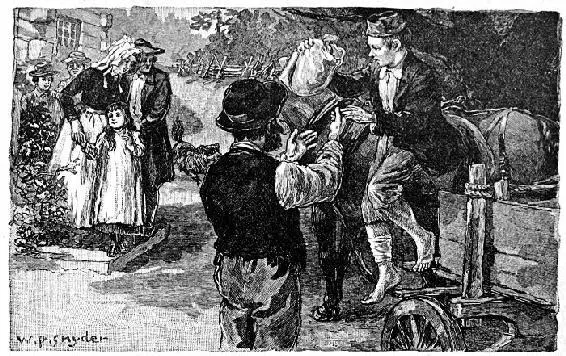The Unseen Hand: or, James Renfew and His Boy Helpers by Elijah Kellogg
Literary Thoughts Edition presents
The Unseen Hand: Or, James Renfew and His Boy Helpers,
by Elijah Kellogg
Transscribed and Published by Jacson Keating (editor)
For more titles of the Literary Thoughts edition, visit our website: www.literarythoughts.com
All rights reserved. No part of this edition may be reproduced, stored in retrieval system, copied in any form or by any means, electronic, mechanical, photocopying, recording or otherwise transmitted without written permission from the publisher. You must not circulate this book in any format. For permission to reproduce any one part of this edition, contact us on our website: www.literarythoughts.com.
This edition is licensed for your personal enjoyment only. It may not be resold or given away to other people. If you would like to share this book with another person, please purchase an additional copy for each recipient. If you’re reading this book and did not purchase it, or it was not purchased for your use only, then please return to Amazon and purchase your own copy of the ISBN edition available below. Thank you for respecting the efforts of this edition.
A vast majority of the noblest intellects of the race have ever held to the idea that,—
“There’s a divinity that shapes our ends,
Rough hew them how we will.”
By its influence they have been both consoled and strengthened under the pressures and in the exigencies of life. This principle, to a singular degree, assumes both form and development in the story of James Renfew, the Redemptioner.
He comes to us as an orphan and the inmate of a workhouse, flung upon the world, like a dry leaf on the crest of a breaker; his mind a blank devoid of knowledge, save the idea of the Almighty and the commands of the Decalogue, whose force, in virtue of prior possession, held the ground and kept at bay the evil influences by which he was surrounded. And in consequence of thus holding aloof from all partnership in vice, he was brow-beaten, trampled upon, and made a butt of by his companions in misfortune.
His only inheritance was the kiss of a dying mother, the dim recollection of her death, and a Bible which he could not read,—her sole bequest.
The buoyancy, the frolic of the blood, the premonition of growing power, which render childhood and youth so pregnant of happiness, and so pleasant in the retrospect, were to him unrevealed. At nineteen the life seemed crushed out of him by the pressure, or, rather puncture, of a miserable present and a hopeless future. In the judgment of the most charitable, he was but one remove from fatuity.
From such material to develop the varied qualities of a pioneer, a man of firm purpose, quick resolve, and resolute to meet exigencies, might well seem to require supernatural power; and yet, by no other alchemy than sympathy, encouragement wisely timed, and knowledge seasonably imparted, was this seeming miracle accomplished.
The pity of Alice Whitman, the broad benevolence of her husband, the warm sympathy of Bertie and his young associates, the ripe counsels of the glorious old grandfather,—sage Christian hero,—and the efforts of Mr. Holmes, who honored his calling, while sowing good seed in the virgin soil of a young heart, were but visible instruments in the grasp of the Hand Unseen.
CHAPTER I. – “THE MOTHER’S BREATH IS WARM.”
It was the autumn of 1792. The beams of the declining sun were resting peacefully upon the time-worn walls of a log house of large dimensions, evidently built to serve the purposes both of a dwelling and a fortress, and situated upon the banks of the Swatara Creek, in the State of Pennsylvania.
A magnificent chestnut-tree, whose trunk and lower branches were all aglow with the long level rays of the retiring light, shadowed a large portion of the spacious door-yard.
This was the homestead of Bradford Whitman, a well-to-do farmer, and whose family consisted of himself and wife, his aged father, and three children, Peter, Albert and Maria, aged respectively sixteen, fourteen and eleven.
Upon one of the highest branches of this great tree was seated Bertie Whitman. The eyes of the lad were eagerly fastened upon the road that, skirting the rising ground upon which the dwelling stood, led to a distant village.
At once his features lighted up with a jubilant expression; he rapidly descended from his perch, and ran to the door of the house, shouting, “Mother! Maria! Grandfather! They’ve got him; they are coming down Liscomb’s hill this minute, and there’s three in the wagon. Oh!”
He would have run to meet the approaching team, and had taken a few steps when he was met by his elder brother.
“Bertie, we’ve got the redemptioner, and I jumped out of the wagon while the horses were walking up our hill to tell you and Maria not to laugh if you can help it, ‘cause it would make him feel bad; but you can’t think how funny he does look; he’s lame besides, and his name’s James Renfew.”
This conversation was interrupted by the rumbling of wheels as their father drove up, where his whole family were grouped around the door. Mrs. Whitman stood on the door-stone, the old grandfather beside her, leaning on his staff, the children in front, while Fowler, the house-dog, with his fore-legs on the shoulders of old Frank, the near horse, his particular friend, was trying to lick his nose and Frank was arching his neck to accommodate him.

Mr. Whitman helped James to get down from the wagon. The boy made no return to the salutations of the family save by a stony stare, not even taking the hand extended to him by Mrs. Whitman. He, however, manifested some token of sensibility by offering to help in unharnessing, and would have limped after the horses to the barn, but his master told him to go into the house and keep still till his leg was better; nevertheless there he stood staring after the horses, and evidently would much rather have followed them to the barn.
The dog then came and smelt of him. Mrs. Whitman told Peter to take him by the hand and lead him into the house. She placed an arm-chair for him, and a smaller one to put his lame leg on, and in a few minutes he was fast asleep.
Judging by appearances Bradford Whitman had drawn a blank at this his first venture in the redemptioner lottery. The children got together (with the dog) under the great chestnut-tree to free their minds and compare notes.
“Isn’t he queer?” said Bertie.
“Did ever anybody see such funny clothes? I guess they were made for him when he was small and so he’s grown out of them, but he’d be real handsome if he had good clothes and his hair combed, and didn’t have such a pitiful look out of his eyes,” said Maria.
“I tell you what he puts me in mind of,” said Bertie, “Mr. William Anderson’s oxen that are so poor, their necks so long and thin; and they look so discouraged, and as though they wanted to fall down and die.”
Peter now related all he had heard Wilson tell their father, and dwelt with great emphasis upon Mr. Wilson’s statement that the lad had not a friend in the world and no home.
“He’s got one friend,” said Bertie, “Fowler likes him, ‘cause he smelt of him and wagged his tail; if he hadn’t liked him he would have growled. Mother’s a friend to him, and father and grandpa and all of us.”
“We will be good to him because he never had any chestnut-tree to play under and swing on, nor any garden of his own,” said Maria.
Читать дальше













